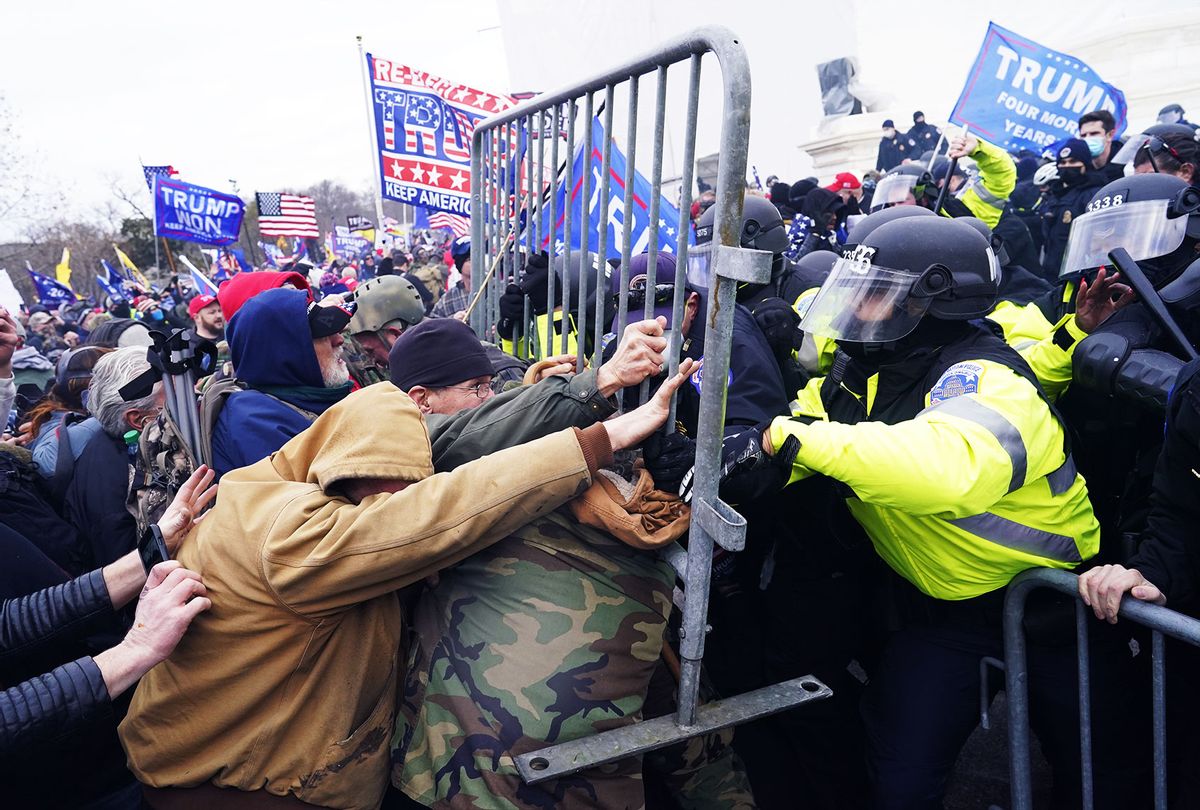New public opinion research from the nonprofit Public Religion Research Institute, part of its 12th annual American Values Survey, has returned alarming findings.
Close to one-third of Republicans in the survey, or 30%, agreed with the statement that "true American patriots may have to resort to violence in order to save our country." That was more than the combined total of Democrats and independents who say the same thing (at 11% and 17%, respectively).
PRRI CEO and founder Robert Jones said the large proportion of Republicans who appear ready to endorse political violence is "a direct result of former President Trump calling into question the election." Jones noted that according to the same survey, more than two-thirds of Republicans (68%) claim that the 2020 presidential election was stolen from Donald Trump, as opposed to only 26% of independents and 6% of Democrats.
RELATED: White terror: Millions of Americans say they'd support violence to restore Trump to power
The study also found that 39% of those who believed that Trump had won the 2020 election endorsed potential violence, compared to only 10% of those who rejected election misinformation. There were also signs of a split based on media consumption, with 40% of Republicans who trust far-right news sources agreeing that violence could be necessary, compared to 32% of those who trust Fox News and 22% among those who trust mainstream outlets. In addition, respondents who said violence may be necessary are more likely to report feeling like strangers in their country, to say American culture has mostly worsened since the 1950s and to believe that God has granted America a special role in human history.
This study comes out just before Tuesday's "off-off-year" 2021 elections, with the national media focused on the race for governor in the swing state of Virginia. Republican nominee Glenn Youngkin has floated baseless conspiracy theories about the election and allowed surrogates to perpetuate Trump's Big Lie, while maintaining some distance from the most extreme claims. Youngkin has said the disgraced former president's endorsement is an "honor" and Trump has repeatedly urged his supporters to vote for Youngkin. The unexpectedly close race between Youngkin and Democrat Terry McAuliffe in a state that has largely trended Democratic since 2008 could provide an important symbolic victory for Republicans.
Want a daily wrap-up of all the news and commentary Salon has to offer? Subscribe to our morning newsletter, Crash Course.
The PRRI survey is not the first indicator that the violent assault on the U.S. Capitol on Jan. 6 may represents a trend rather than an anomaly. Ashli Babbitt, a Jan. 6 rioter killed by a Capitol police officer while attempting to force her way into a secure area, has been turned into a martyr by both Trump and many of his followers. At a recent rally in Virginia, Republicans pledged allegiance to a flag that was supposedly at the Capitol during that riot, and speakers called for Trump supporters to "monitor" election workers and officials. One Virginia election official recently described how Republican poll watchers in his state have acted with "a level of energy and sometimes aggression" and said he had received "very personal attacking, trolling emails accusing me, pre-election, of fraud and even making specific allegations of what the fraud would be."
Indeed, the idea that hypothetical voter fraud could justify violence is, in itself, something new on the American political scene. There have been accusations of fraudulent elections throughout American history — some valid, some bogus — but Trump and his supporters are alone in suggesting violence. (Of course, there was one other presidential election that led to violence: The election of 1860, which sparked the Civil War.) Trump's team lost virtually all the dozens of court cases filed over the 2020 election, and their attempt to get the results overturned was unanimously rejected by the Supreme Court. Even former Attorney General Bill Barr and many key Republican legislators rejected Trump's claims of fraud, meaning that anyone who insists Trump was the real winner presumably thinks that the nefarious conspiracy included dozens of high-ranking Republicans.
Jones, the PRRI CEO, did not mention that additional context, but perhaps did not have to. He described the results of the group's new survey "an alarming finding," adding: "I've been doing this a while, for decades, and it's not the kind of finding that as a sociologist, a public opinion pollster, that you're used to seeing."
More on the darker possibilities emerging from the Trump-era right:



Shares